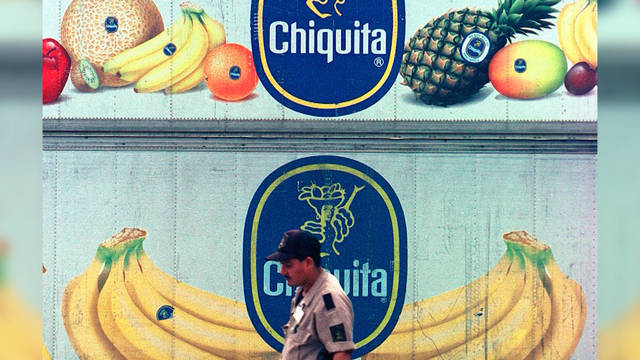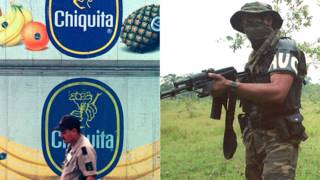
By Amy Goodman & Denis Moynihan
“Work all night on a drink of rum
Daylight come and me wan’ go home
Stack banana till de morning come
Daylight come and me wan’ go home
Come, Mister tally man, tally me banana
Daylight come and me wan’ go home”
The song “Day-O (Banana Boat Song),” made famous by the late, great performer and civil rights activist Harry Belafonte, originated on the docks of Kingston, Jamaica, as workers loading bananas onto boats throughout the night awaited daylight and the arrival of the “tallyman,” to document their labors. While Belafonte made the song a global sensation, its popularity didn’t blunt the human toil behind the global banana trade.
This week, a jury in a federal court in Miami rendered a $38 million verdict against the multinational Chiquita Brands International for its role in funding right-wing paramilitary death squads in Colombia that killed banana workers there. Thousands of banana workers have been killed over the last century in Colombia, but this case, which wended its way through the US federal court system for over 17 years, was the first ever jury verdict, addressing specifically the murder of eight workers.
“The jury in this case ruled that Chiquita was responsible for financing the AUC paramilitary death squads over a period of at least seven years,” EarthRights International general counsel Marco Simons said after the verdict on the Democracy Now! news hour. He was part of the legal team representing the workers and their survivors. The AUC, or United Self-Defense Forces of Colombia, was a brutal paramilitary that the US designated as a terrorist organization. “Chiquita essentially had a partnership with the paramilitaries, that they voluntarily paid these groups in order to protect Chiquita against left-wing guerrillas and essentially to pacify the operating environment in the banana-growing region of Colombia…these eight deaths represent only the start of Chiquita’s potential liability for its conduct, not the end of it. These deaths represent less than 1% of the claims for killings that have been filed against Chiquita in U.S. courts. There are thousands of claims that have been filed.”
This is not the first time Chiquita has been in court over financing murders of banana workers. Simons explained, “in 2007, Chiquita pled guilty to a federal felony for essentially making financial transactions with a terrorist organization, which was the AUC paramilitaries, which was prohibited under U.S. federal law. And so they paid a $25 million fine at that point, but none of that money went to the victims of their conduct.”
Chiquita is the multinational corporation that grew out of the notorious United Fruit Company, a massive enterprise that wielded economic sway over a number of Central and South American countries, including Colombia. United Fruit supported authoritarian governments throughout the region, and successfully lobbied the US government to overthrow the democratically-elected Guatemalan government of President Jacobo Arbenz in 1954, after Arbenz enacted several labor and land reforms intended to ease the suffering of Guatemalan workers. Then-US Secretary of State John Foster Dulles had represented United Fruit as a corporate lawyer. His brother, Allen Dulles, ran the CIA. United Fruit Company operated from 1899 through 1984, when Cincinnati, Ohio billionaire Carl Lindner, Jr. transformed the company into Chiquita.
The banana business is huge. In 2022, the US imported $2.8 billion worth of bananas from Guatemala, Honduras, Costa Rica, Mexico, Ecuador and Colombia. Yet the workers who grow, harvest, transport and, yes, stack the bananas share in far too little of the revenue.
An April Op-Ed in The Grocer written by Alistair Smith, International Coordinator for the fair trade organization Banana Link, opened, “‘Suck it up, buttercup’ is the message that came from banana industry players at the World Banana Forum conference in Rome this month. In a world where fruit prices are effectively set by supermarkets, it is a message to them: the prices they pay suppliers must go up, and the era of super-cheap banana prices for consumers must draw to a close.” Smith has long campaigned for just wages and safe, humane working conditions for banana workers. His piece continued, “prices must be high enough to ensure a living wage for those who produce bananas…Mass migration to the US and Spain is provoked by the lack of economic opportunities in banana-producing countries.”
Multinational corporations like Chiquita rarely make improvements unless forced to. “The jury verdict here is a signal to corporate America that it can’t treat the lives of people in the countries where they work as the cost of doing business,” Marco Simons said. “That’s what Chiquita did here…producing bananas at the lowest price possible. And that led to the deaths of thousands of people, including the plaintiffs here.”
Thanks to this jury verdict, some daylight has come to the violent practices behind the blue sticker on each bunch of Chiquita bananas.












Media Options